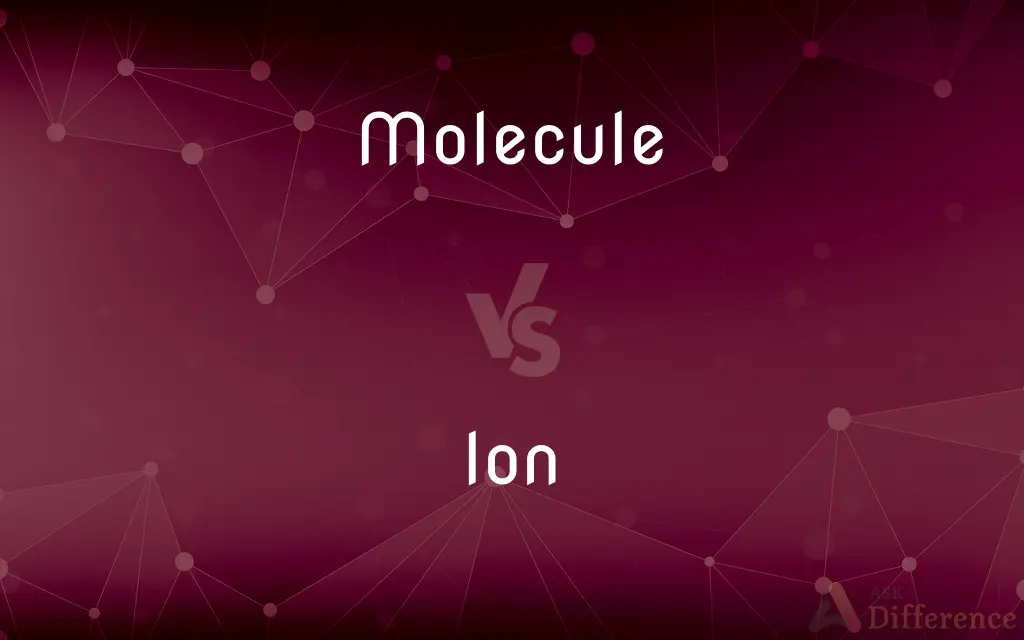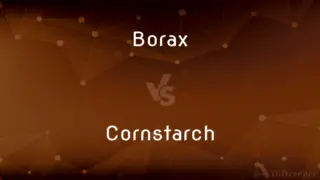Molecule vs. Ion — What's the Difference?

Difference Between Molecule and Ion
ADVERTISEMENT
Compare with Definitions
Molecule
A molecule is an electrically neutral group of two or more atoms held together by chemical bonds. Molecules are distinguished from ions by their lack of electrical charge.
Ion
An ion () is a particle, atom or molecule with a net electrical charge. The charge of the electron is considered negative by convention.
Molecule
The smallest particle of a substance that retains the chemical and physical properties of the substance and is composed of two or more atoms; a group of like or different atoms held together by chemical forces.
Ion
An atom or a group of atoms that has acquired a net electric charge by gaining or losing one or more electrons.
Molecule
A small particle; a tiny bit.
ADVERTISEMENT
Ion
An atom or group of atoms bearing an electrical charge, such as the sodium and chlorine atoms in a salt solution.
Molecule
(chemistry) The smallest particle of a specific element or compound that retains the chemical properties of that element or compound; two or more atoms held together by chemical bonds.
Hydrogen chloride is a diatomic molecule, consisting of a hydrogen atom and a chlorine atom.
Ion
An atom or goup of atoms (radical) carrying an electrical charge. It is contrasted with neutral atoms or molecules, and free radicals. Certain compounds, such as sodium chloride, are composed of complementary ions in the solid (crystalline) as well as in solution. Others, notably acids such as hydrogen chloride, may occur as neutral molecules in the pure liquid or gas forms, and ionize almost completely in dilute aqueous solutions. In solutions (as in water) ions are frequently bound non-covalently with the molecules of solvent, and in that case are said to be solvated. According to the electrolytic dissociation theory, the molecules of electrolytes are divided into ions by water and other solvents. An ion consists of one or more atoms and carries one unit charges of electricity, 3.4 x 10-10 electrostatic units, or a multiple of this. Those which are positively electrified (hydrogen and the metals) are called cations; negative ions (hydroxyl and acidic atoms or groups) are called anions.
Molecule
A tiny amount.
Ion
One of the small electrified particles into which the molecules of a gas are broken up under the action of the electric current, of ultraviolet and certain other rays, and of high temperatures. To the properties and behavior of ions the phenomena of the electric discharge through rarefied gases and many other important effects are ascribed. At low pressures the negative ions appear to be electrons; the positive ions, atoms minus an electron. At ordinary pressures each ion seems to include also a number of attached molecules. Ions may be formed in a gas in various ways.
Molecule
One of the very small invisible particles of which all ordinary matter is supposed to consist.
Ion
A particle that is electrically charged (positive or negative); an atom or molecule or group that has lost or gained one or more electrons
Molecule
The smallest part of any substance which possesses the characteristic properties and qualities of that substance, and which can exist alone in a free state.
Molecule
A group of atoms so united and combined by chemical affinity that they form a complete, integrated whole, being the smallest portion of any particular compound that can exist in a free state; as, a molecule of water consists of two atoms of hydrogen and one of oxygen. Cf. Atom.
Molecule
(physics and chemistry) the simplest structural unit of an element or compound
Molecule
(nontechnical usage) a tiny piece of anything
Share Your Discovery

Previous Comparison
Borax vs. Cornstarch
Next Comparison
Forget vs. Forgot















































